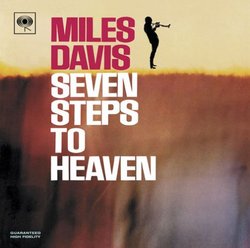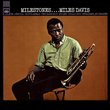| All Artists: Miles Davis, Gil Evans Title: The Seven Steps to Heaven Members Wishing: 1 Total Copies: 0 Label: Sony / Bmg Japan Release Date: 1/13/2008 Album Type: Import Genres: Jazz, Pop Style: Bebop Number of Discs: 1 SwapaCD Credits: 1 |
Search - Miles Davis, Gil Evans :: The Seven Steps to Heaven
 | Miles Davis, Gil Evans The Seven Steps to Heaven Genres: Jazz, Pop
Japanese DSD remastered reissue of 1963 album, packaged in a standard jewel case. Sony. |
Larger Image |
CD DetailsSynopsis
Album Description Japanese DSD remastered reissue of 1963 album, packaged in a standard jewel case. Sony. Similar CDs
|
CD ReviewsA pity that this is over-looked, it's an awesome album. JetTone12 | USA | 12/17/2003 (5 out of 5 stars) "This album, which was recorded in 1963 by Miles with two separate groups, seems to have a bit of a transitional feel to it. However, don't let that fool you. This is a gem. The Los Angeles studio group is quite excellent, with Victor Feldman on piano (who is absolutely AMAZING on this album), Ron Carter on bass and Frank Butler on drums. The other group is Miles's second great Quintet minus Wayne Shorter with George Coleman on tenor saxophone. I love how there is a contrast throughout this album. Slow tune, faster tune. It's a brilliant pattern. I was extremely surprised by Miles's haunting rendition of "Basin Street Blues", a song Louis Armstrong made famous. However, Miles puts his own spin on it, with his harmon mute and a slow, ballad feel. Victor Feldman plays the most beautiful piano solo here also, just butter. He swings like crazy. The title track is a speedy hard bop classic featuring Miles and Coleman bouncing off of each other's ideas and Herbie Hancock holding everything together brilliantly. The energy here is astounding. Miles is almost struggling to keep up with these young cats, because they're real sparkplugs. "I Fall In Love Too Easily" is another beautiful ballad that became a part of the standard repertoire for Miles. He went on to record this piece several times (see the Fillmore live albums). He plays it with the harmon here and it's wonderful. "So Near, So Far", is a brilliant mid-tempo piece which is perfectly titled. It swings soulfully. Miles really uses some excellent upper register in this solo and gets up there very nicely. Coleman is in his usual form and Herbie sounds cool as ever. "Baby Won't You Please Come Home" is yet another look at the muted ballad style of Miles. Very relaxed, yet ready to split at any minute he would choose to. "Joshua" is the final piece and is a speedy romp which really looks forward to what the Quintet would be doing in the future. Fine hard bop.If you're looking for a good Miles album from the 1960's with the type of sound he had back then, this is a good one to look at. Very under-rated work." Heavenly Indeed! Andrew Stevenson | Union Springs, New York | 08/29/2004 (5 out of 5 stars) "Although "Seven Steps To Heaven" is one of Miles Davis's lesser known releases, it is one of his greatest. The music is from two 1963 recording sessions separated by a month and a country: one session went down in New York City, the other in Hollywood. The New York date features Miles, tenor saxophonist George Coleman, pianist Herbie Hancock, bassist Ron Carter, and drummer Tony Williams. The Hollywood session features Miles, Coleman, and Carter with pianist Victor Feldman and drummer Frank Butler. Most jazz recordings start with an uptempo swinger. "Seven Steps To Heaven" leads off with a moody "Basin Street Blues." It alone is worth the price of this CD. Miles never played a ballad better and that's saying something! He is lyrical and sparse; there is not a wasted note. Victor Feldman follows with an equally memorable piano solo. All of the other cuts are of the same high quality. If I had to choose a second it would be the swinging "Joshua." It's a Victor Feldman composition but it was one of the cuts recorded in New York with Herbie at the keys. Another joy on this recording is the underrated George Coleman. It has been reported that Tony Williams did not like his playing in the group and wanted George out and Wayne Shorter in. While I do love Wayne, I'm glad George had the chance to shine here. I have talked to Mile Davis fans who have heard of but never actually heard "Seven Steps To Heaven." If you are in this category don't delay, get and enjoy this classic." I think I get the joke? Poco Ritard | Seattle, WA USA | 06/06/2008 (5 out of 5 stars) "Firstly, I've played enough jazz to know what MY opinion of Miles is worth (irrelevant). It's exquisite, another classic. You need amateur reviews to know that? 5 stars because we owe you, man.
But: some reviewers have pointed out that this disc really has two bands on it. Rather than being a clash, or forced mixture, or a product of some rush to fulfill a contractual obligation, I think Miles was playing a bit of a joke on us. Look at the way the groups alternate tracks (1-3-5 vs 2-4-6) and styles (more traditional, more cool). It's almost a 2-step dance. I think the arrangement of tracks on this album is an ironic comment (besides being a pleasure to listen to), a kind of straddling of two worlds, one of which he knew intimately and the other he helped create. Which way to heaven, yo? Back to childhood, roots, beautiful and familiar or into the exciting but uncharted future? He's not sure yet, and he doesn't give us the answer. There are 6, not seven tracks. We haven't got there yet. Don't worry, Miles will show us the way. He usually does." |

 Track Listings (6) - Disc #1
Track Listings (6) - Disc #1